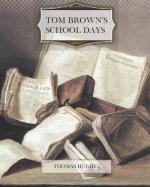Tom showed such undisguised and open-mouthed interest in his narrations that the old guard rubbed up his memory, and launched out into a graphic history of all the performances of the boys on the roads for the last twenty years. Off the road he couldn’t go; the exploit must have been connected with horses or vehicles to hang in the old fellow’s head. Tom tried him off his own ground once or twice, but found he knew nothing beyond, and so let him have his head, and the rest of the road bowled easily away; for old Blow-hard (as the boys called him) was a dry old file, with much kindness and humour, and a capital spinner of a yarn when he had broken the neck of his day’s work, and got plenty of ale under his belt.
What struck Tom’s youthful imagination most was the desperate and lawless character of most of the stories. Was the guard hoaxing him? He couldn’t help hoping that they were true. It’s very odd how almost all English boys love danger. You can get ten to join a game, or climb a tree, or swim a stream, when there’s a chance of breaking their limbs or getting drowned, for one who’ll stay on level ground, or in his depth, or play quoits or bowls.
The guard had just finished an account of a desperate fight which had happened at one of the fairs between the drovers and the farmers with their whips, and the boys with cricket-bats and wickets, which arose out of a playful but objectionable practice of the boys going round to the public-houses and taking the linch-pins out of the wheels of the gigs, and was moralizing upon the way in which the Doctor, “a terrible stern man he’d heard tell,” had come down upon several of the performers, “sending three on ’em off next morning in a po-shay with a parish constable,” when they turned a corner and neared the milestone, the third from Rugby. By the stone two boys stood, their jackets buttoned tight, waiting for the coach.




